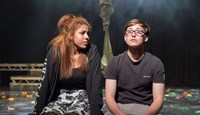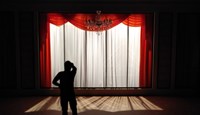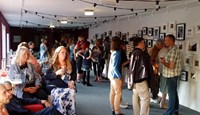- News
- Guest-Blog-The-Iconoclasts
Guest Blog - The Iconoclasts
You performed The Iconoclasts at the Edinburgh Fringe, but outside the more mainstream performance times and places for the festival. Did you purposely stay outside the mainstream of fringe?
We were not an easy find at the Fringe, though that was more about getting our venue and time right than it was about avoiding the mainstream. The immersive nature of the show compelled us to have a believable venue and an appropriate time, we just felt it didn’t work for us to be a show you fit in between lunch and dinner or that had clearly compromised on venue so that the location was easier. Getting those things right pushed us away from the main hub bub, but hopefully enhanced the experience for the audience on the night.
The show tells a family story, dabbles in politics, feels like cabaret and is backed by a live funk band. How and why did you hit upon this very original style of theatre? How do you think it might develop/change in the next five years or so?
The "show within a show" form appeals to us because it allows our productions to enjoy all the typically thrilling elements to live art, such as dance, music, comedy and so on, while offering the opportunity to comment on the audience/performer relationship at the same time. The iconoclasts, for instance, is packed with thoughts about exploitation, politics & our obsession with fame and drags the characters through a bleak family history; yet, for most of the the hour, the audience is enjoying comedy, musical numbers, magic and drag. In this way, the cabaret show-within-a-play device disguises these tricky elements with fun, high energy entertainment and we get to have our cake and eat it: the wild night out of cabaret and the thoughtful exchange of ideas of theatre. We did a similar thing with our show “club bazaar”, which was a series of mini-plays told by three actors who lived in a world where music and theatre didn’t exist. Again, the show within a show form gave us an interesting subject matter for commentary - the importance of art and the marginalisation of art - while the method of delivery gave the freedom to explore fun story telling techniques within that form. It’s a style that has worked for us and I can see us continuing to use.
Where do you want your success to take you?
I think the success of the company will depend on our ability to keep making stuff which is true to our tastes and interests and continues to refine our relationship with form. It would be great to take these kinds of shows to the West-End, in which the audience realises that they are co-creating the theatre experience with their presence and that the exchange of ideas is a two way street, even if they don’t speak a word. A long Dear Hunter run in a large scale theatre would be interesting. Individually we want to work on as much new stuff around the country as possible with as many different collaborators as we can and just keep getting better and finding more interesting topics and techniques to work on.
Is there a political edge to your work?
We love to get political but I think we’re agreed it’s got to be rooted in the character’s motivations more than ours. There have always been undertones of Irish politics in this show, for instance, but they’ve got less and less as we’ve thought “why are they bringing that up now?”, “would they say that?” And so on. On the other hand, Danny is a left-leaning political comedian, so his character goes to town on the government and Brexit throughout because that’s who he is. And, as world politics has got more dramatic these last two years, we’ve actually increased the amount of political commentary he does. So, I think we try to work out the characters’ politics and write to them rather than trying to use them as a mouthpiece for our views.
![]() Will Taylor in The Iconoclasts
Will Taylor in The Iconoclasts
Who thought of the name Dear Hunter and why?
It’s a play on words I’ve always thought could evoke a lot of different tones emotionally. Most straightforwardly they’re the first two words of a letter, something which suggests intimacy, opinions, news, love, heartache, friendship, separation and lots more of the sort of notes our theatre wants to encompass. I like how that prefaces what we do. However there’s also the juxtaposition of the dear hunter, where hunter is a noun rather than a name, and the deer hunter homophone that it’s naturally confused with. The first seems affectionate while the other cold-blooded. The ambiguity is fitting I think too as we try to keep our shows more like food for thought than answer booklets - the name should be no different!








Conversations